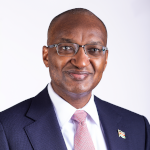Thursday, Oct 13, 2022 | 04:00 PM - 04:30 PM
Location: Cedar Hall, HQ1-1-660

 |
Patrick Njoroge Governor of the Central Bank of Kenya
|
Dr. Patrick Njoroge is the ninth Governor of the Central Bank of Kenya (CBK), and has been in office since June 19, 2015. He has overseen a significant overhaul of the banking system in Kenya, including the launch of the first Kenya Banking Sector Charter. He also led the country in the launch of the new generation currency banknotes and coins, thus fulfilling a much-anticipated constitutional requirement. Dr. Njoroge has been keen on facilitating the growth of the Micro, Small and Medium Sized Enterprise (MSME) sector, which has been the engine of growth of the Kenyan economy. Dr. Njoroge joined CBK after a twenty-year career at the International Monetary Fund (IMF) in Washington, DC. Prior to his appointment as Governor, Dr. Njoroge was Advisor to the IMF Deputy Managing Director from December 2012, where his responsibilities included assisting in overseeing the IMF’s engagement with a large swath of IMF members. He also served as Deputy Division Chief in the IMF’s Finance Department (2006-2012), IMF’s Mission Chief for the Commonwealth of Dominica (2005-2006) and in other capacities since 1995. Prior to joining the IMF, Dr. Njoroge worked as an Economist at the Ministry of Finance (1993-1994) and as a Planning Officer at the Ministry of Planning (1985-1987). He holds a PhD degree in Economics from Yale University (1993), a Master of Arts degree in Economics (1985) and a Bachelor of Arts degree in Economics (1983) from the University of Nairobi. Dr. Njoroge’s professional and research interests lie in Macroeconomics, Economic Policy, International Finance, Development Economics, Econometrics and Monetary Policy. Dr. Njoroge began his second four-year term in June 2019. He was appointed to the UN Task Force on Digital Financing by Secretary General Antonio Guterres in November 2018.
 |
Abebe Aemro Selassie Director, African Department, IMF
|
Abebe Aemro Selassie is the Director of the African Department at the International Monetary Fund (IMF), a position he has held since 2016. In this capacity, Mr. Selassie oversees the IMF’s operations and engagement with 45 countries across sub-Saharan Africa, spanning the three main pillars of IMF work—policy advice, lending operations, and technical assistance. His responsibilities also include building strategic partnerships and dialogue with senior policymakers and institutions across the region.
Before taking up his current position, Mr. Selassie gained extensive experience in a wide-ranging 22-year career at the IMF. He held various senior positions, including Deputy Director in the African Department, Mission Chief for Portugal and South Africa, Division Chief of the African Department’s Regional Studies Division, and the IMF’s Senior Resident Representative in Uganda. Earlier in his career, he worked on the Fund’s lending programs with Turkey, Thailand, Romania and Estonia as well as being deeply involved in policy, operational review, and economic research work.
Before joining the IMF in 1994, he worked for the Government of Ethiopia and the Economist Intelligence Unit in London.
Mr. Selassie is an Ethiopian national. He completed his graduate studies at the London School of Economics.
Key Points:
Quotes:
“Cost of living has become a significant social issue policymakers cannot afford to ignore.” Patrick Njoroge
“You [policy makers] need to anchor expectations of the regular people on the street so they do not freak out; they do actually need to see that you are in control.” Patrick Njoroge
“There is need for an international social contract; there should be a stronger one from institutions like ours.” Abebe Selassie
“Climate change should be front and center of everything that we do; it should not be an add-on on the side.” Patrick Njoroge
Contributor: Najla Nakhle